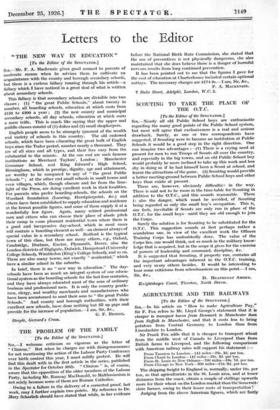Letters to the Editor
" THE NEW WAY IN EDUCATION " [To the Editor of the SPECTATOR.]
SIR,—Mr. F. A. Mackenzie gives good counsel to parents of moderate means when he advises them to cultivate an acquaintance with the county and borough secondary schools, but there is a curious fallacy running through his article—a fallacy 'which I have noticed in a great deal of what is written about secondary schools.
This fallacy is that secondary schools-are divisible into two classes ; (1) " the 'great Public Schools," about twenty in number, all boarding schools, education at which costs from £150 to £200 a year ; (2) the new county and municipal secondary schools, all day schools, education at which costs a mere trifle. This is moch like saying that the upper and middle classes consist of (1) dukes and (2) small shopkeepers.
English people seem to be strangely ignorant of the wealth and variety of schools in this country. The old endowed schools, which have been educating the great bulk of English boys since the Tudor period, number nearly a thousand. They arc of all sizes and all types, and their fees vary from the substantial to the minute. At the one end are such famous institutions as Merchant Taylors', London ; - Manchester Grammar School, and King Edward's High School. Birmingham, which in prestige, dignity, age and attainment, are worthy to be compared to any of " the great Public Schools " ; at the other end small schools in small towns and even villages, which, though obscure and far from the lime- light of the Press, are doing excellent work in their localities. For parents who prefer boarding-schools, the schools on the Woodard foundation (Lancing, Hurstpierpoint, &e.) and others have been established to supply education and residence at the lowest possible figures, and some of them supply it at a wonderfully low figure. Again, many retired professional men and others who can choose their place of abode pitch their camp in some pleasant residential town where there is a good and inexpensive day-school, which in most cases will contain a boarding element as well—an element always of special value in a secondary, school. Bedford is the typical town of this class, but there are many others, c.g., Oxford, Cambridge, DUrham, Exeter, Plymouth, Dover, also the London districts of Highgate, Dulwich, Hampstead (University College School), Wimbledon (King's College School); and so on. There arc also many towns, not exactly " residential," which have a similar school in the suburbs.
In brief, there is no " new way in education." The day- schools have been as much an integral system of our educa- tionalsystem as the boarding schools for the last four centuries, and they have always educated most of the sons of ordinary business and professional men. It is only the country gentle- men, clergy, and wealthy merchants and manufacturers who have been accustomed to send their sons to " the great Public Schools." And county and borough authorities, with their excellent new schools, have done nothing but fill up gaps and provide for the increase of population.—I am, Sir, &c., G. F. BRIDGE:. Steeple, Gerrard' s Cross.


































 Previous page
Previous page